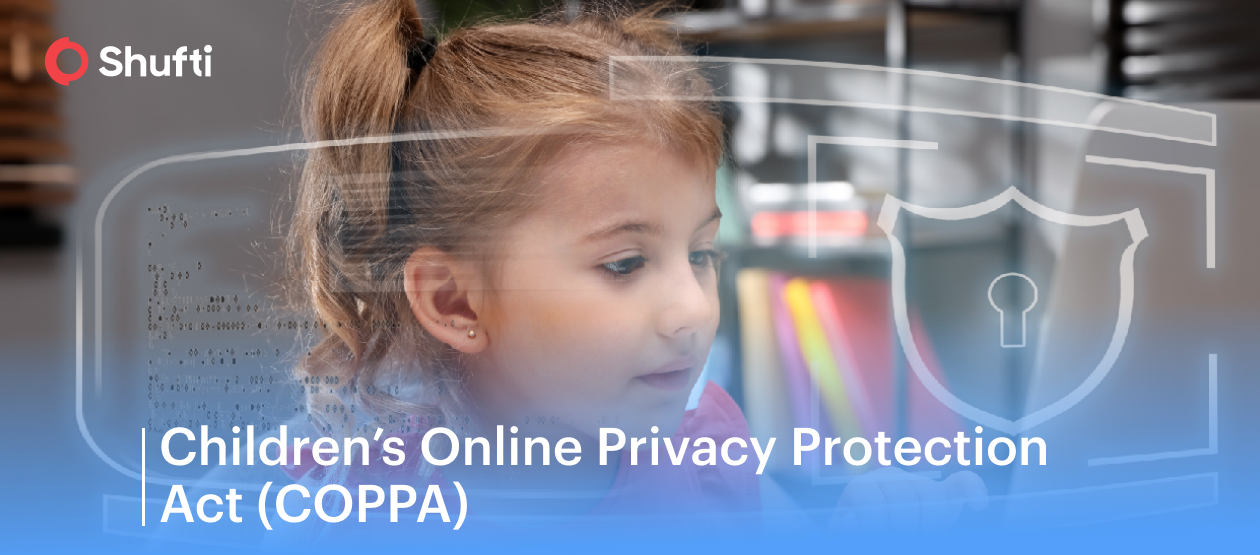Children’s Online Privacy Protection Act (COPPA)

Before collecting personal information from users, especially children, businesses need to follow strict data privacy and age verification regulations. These rules are essential for building trust, respecting user rights, and ensuring that personal data is handled tactfully and responsibly. Now that it is more and more common for minors to have unfettered access to the internet, the stakes are even higher. That’s why laws like the Children’s Online Privacy Protection Act (COPPA) are so vital in today’s hyperdigital world.
What is COPPA?
The Children’s Online Privacy Protection Act (COPPA) is a United States federal law designed to safeguard the personal information of children under the age of 13. Passed in 1998 and enforced by the Federal Trade Commission (FTC), COPPA outlines how businesses must collect, manage, and store data belonging to minors.
This law applies to websites, apps, games, smart devices, and ad networks that either target children or knowingly collect data from them. COPPA sets clear boundaries: businesses must obtain parental consent, publish detailed privacy policies, and limit data sharing with third parties.
When Does COPPA Apply?
COPPA is applicable under the following conditions:
- The user is a U.S. resident and under the age of 13 years old.
- The business is based in the U.S. or directed at children in the U.S.
- The service collects or processes children’s personal information.
- The platform includes features that appeal to children, such as interactive games, animations, or child-friendly design.
COPPA does not cover more hot button issues like cyberbullying or inappropriate language, but it does play a significant role in regulating data privacy for younger users.
What is COPPA Compliance?
COPPA compliance refers to the measures businesses must take to lawfully collect, store, and use data from children under 13. The FTC ensures that organizations follow these rules. Non-compliance with COPPA can result in significant penalties, with fines reaching over $43,000 per violation, depending on the circumstances.
Key Requirements for COPPA Compliance
1. Identifying Child-Directed Services
Compliance begins with determining whether a platform or a service is directed at children under the age of 13 or collects personal data from them. This includes platforms with design elements, features, or content that are likely to attract younger audiences. Services that fall into this category are subject to COPPA’s full range of requirements.
2. Publishing a Transparent Privacy Policy
A publicly available privacy policy must outline how data from children is collected, used, and stored. It should also describe the rights of parents or legal guardians and detail the procedures in place to protect that data. Language used in the policy should be accessible and easily understood.
3. Parental Notification Before Data Collection
COPPA requires that parents or guardians be notified before any personal information is collected from a child. This notification must clearly identify the types of data involved, the reasons for its collection, and how it will be used. If consent is not obtained within a certain timeframe, any associated contact information must be discarded.
4. Verifiable Parental Consent
The act mandates that operators of child-directed services obtain verifiable parental consent before collecting or processing a child’s personal information. Acceptable methods include signed forms, submission of identification documents, payment verification, or biometric confirmation such as facial recognition.
5. Rights to Access and Control
Parents have legal rights to access the personal data collected from their children, revoke previously granted consent, and request permanent deletion. Platforms must provide clear processes for guardians to exercise these rights in a timely manner.
6. Data Protection Obligations
To ensure the safety and privacy of children’s information, COPPA outlines several data protection responsibilities:
- Limit the collection of data to what is necessary for the functionality of the service
- Retain personal data only as long as needed for its intended purpose
- Use secure storage and disposal methods to prevent unauthorized access
- Restrict third-party access to children’s personal information unless explicitly permitted
Emerging Global Trends in Children’s Data Protection
While COPPA remains a key U.S. regulation, similar laws are gaining traction globally. The EU’s GDPR includes special provisions for children under 16, requiring parental consent and age-appropriate transparency. In the UK, the Age-Appropriate Design Code outlines strict expectations for platforms accessed by minors. Countries like South Korea, Brazil, and India are also adopting youth-centered privacy frameworks.
There is a global recognition that children need special protection online. This is prompting platforms to build better age verification systems, limit data collection, and offer privacy-first design from the ground up.
Final Thoughts
Children are the most vulnerable users online, making the protection of them and their privacy a moral obligation as well as a legal one. COPPA offers a strong starting point for businesses aiming to responsibly engage with younger audiences. By understanding the law following best practices, and staying aware of international trends, companies can build safer digital experiences for young people everywhere.

 Explore Now
Explore Now






